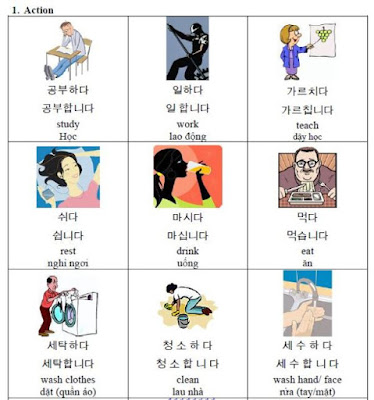A/V-더니 grammar = (1) and now, (2) and then, (3) but now
Usage:
- State a reason for changes that was directly witnessed in the past = and as a result / and now…(example 1-7)
- Recall an action witnessed in the past and its following action = and then… ( example 7)
- State a reason for changes that was directly witnessed in the past = and as a result / and now…(example 1-7)
- Recall an action witnessed in the past and its following action = and then… ( example 7)
- Indicate a contrast in the past and the current state of affairs = but now…( example 8, 9)
- Can only be used for subject as the 2nd or 3rd person. However if the speaker refers himself or herself in an objective manner, the 1st person can be used as subject. (example 10,11)
Adjective + -더니:
덥다 -- 덥더니
바쁘다 -- 바쁘더니
똑똑하다 -- 똑똑하더니
Verb + -더니:
웃다 -- 웃더니
보다 -- 보더니
가다 -- 가더니
공부하다 -- 공부하더니
저촉하다 -- 저촉하더니
- Can only be used for subject as the 2nd or 3rd person. However if the speaker refers himself or herself in an objective manner, the 1st person can be used as subject. (example 10,11)
Adjective + -더니:
덥다 -- 덥더니
바쁘다 -- 바쁘더니
똑똑하다 -- 똑똑하더니
Verb + -더니:
웃다 -- 웃더니
보다 -- 보더니
가다 -- 가더니
공부하다 -- 공부하더니
저촉하다 -- 저촉하더니
Examples:
1. 앤디 씨는 교수가 된대요.
- 그래요? 어렸을 때부터 똑똑하더니 교수가 됐군요.
- 그래요? 어렸을 때부터 똑똑하더니 교수가 됐군요.
I heard that Andy became a professor.
- Really, he has been smart since he was a child, and now he is a professor.
- Really, he has been smart since he was a child, and now he is a professor.
2. 아기 때부터 예쁘더니 배우가 되었어요.
She was pretty since childhood, and now she become an actress.
3. 안나 씨가 다이어트를 하더니 날씬해졌네요.
Anna went on a diet and now became thin.
4. 토니 씨가 요즘 돈이 없다고 하더니 여행도 못 간 것 같아요.
Tony said he has been broken recently, and now he couldn't go on the trip.
5. 수지 씨가 평소에 돈을 아끼고 저촉하더니 집을 샀군요.
Suzy is frugal daily to save her money, and now she bought a house.
6. 마이크 씨는매일 운동하더니 건강해진 것 같아요.
Mike does exercise daily, and as a result he seems becoming healthy.
7. 동생은 집에 들어오더니 갑자기 울기 시작했어요.
My little brother enter the house and then suddenly started crying.
8. 오후에는 덥더니 저녁에는 쌀쌀하네요.
It was hot in the afternoon, but now it is chilly in the evening.
9. 토니 씨가 월초에는 바쁘더니 요즘은 좀 한가해진 모양이에요.
Mark was busy at the beginning of the month,but now he seems a bit free.
10. 내가 (wrong)/네가 (correct) 열심히 공부하더니 1등을 했어요.
You has studied diligently, and now you ranked the 1st.
11. (내가) 며칠 전부터 피곤하더니 오늘은 열도 나고 아파요.
I haven't felt good for last few days, and now I get a fever.
Comparison between A/V-더니 grammar and V-았/었더니 grammar
1. A/V-더니 grammar
- 2nd and 3rd person subject (1st person subject is possible when reflecting on oneself in an objective manner)
- The subjects of both clauses must be the same
- The subjects of both clauses must be the same
- Can be used for Verb and Adjective
- Meaning:
+ result of a past occurrence
+ contrast between past and present
+ recall an action witnessed in the past and its following action
+ result of a past occurrence
+ contrast between past and present
+ recall an action witnessed in the past and its following action
- 1st person subject (3rd person is possible when quoting someone else’s action or behavior)
- The subject of 2 clauses can be different
- Can be used for Verb only.
- Meaning:
+ result of a past occurrence
+ express speaker’s discovery after doing something
+ recall a reaction or behavior of someone to the action or behavior in the preceding clause
+ connect quotes with action
+ result of a past occurrence
+ express speaker’s discovery after doing something
+ recall a reaction or behavior of someone to the action or behavior in the preceding clause
+ connect quotes with action
Label: Grammar Lv2






